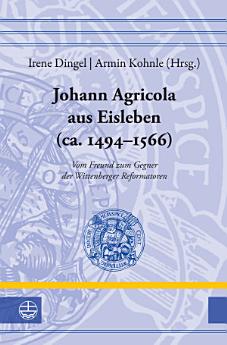Johann Agricola aus Eisleben (ca. 1494–1566): Vom Freund zum Gegner der Wittenberger Reformatoren
Irene Dingel · Armin Kohnle
May 2025 · Leucorea-Studien zur Geschichte der Reformation und der Lutherischen Orthodoxie (LStRLO) Book 43 · Evangelische Verlagsanstalt
Ebook
440
Pages
family_home
Eligible
info
reportRatings and reviews aren’t verified Learn More
About this ebook
Johann Agricola aus Eisleben, auch genannt Islebius, gehörte zum Kreis der Wittenberger Reformatoren und genoss lange das Vertrauen Martin Luthers und Philipp Melanchthons. Aber bald wurde er zu einem ihrer erbittertsten Gegner. Zwar verstand sich Agricola selbst als treuer Repräsentant der Wittenberger Theologie, geriet aber durch seine eigenwilligen Positionen und seine Mitwirkung am Augsburger Interim von 1548 immer wieder in verschiedene Auseinandersetzungen um die reformatorische Lehre. Selbstbild und Fremdbild klafften weit auseinander.
Die hier versammelten Aufsätze versuchen, diesem Befund auf den Grund zu gehen, indem sie die verschiedenen Wirkungsstätten und Wirkungsperioden Agricolas in den Blick nehmen und dazu die in jenen Zusammenhängen entstandenen Schriften heranziehen. Damit eröffnet der Band eine neue Perspektive auf Agricola, die ihn nicht auf den Streittheologen reduziert, sondern die Vielfalt seines Lebens und Wirkens erschließt.
Mit Beiträgen von Marion Bechtold-Mayer, Irene Dingel, Tobias Jammerthal, Henning P. Jürgens, Brandt Klawitter, Ingo Klitzsch, Armin Kohnle, Nicole Kuropka, Stefan Michel, Stefan Michels, Markus Müller, Jonathan Reinert, Stefan Rhein, Hans-Otto Schneider, Eike Hinrich Thomsen und Christopher Voigt-Goy.
[Johann Agricola from Eisleben (ca. 1494–1566). From Friend to Foe of the Wittenberg Reformers]
Johann Agricola from Eisleben, also known as Islebius, belonged to the circle of Wittenberg reformers and enjoyed the trust of Martin Luther and Philipp Melanchthon for a long time. However, he eventually became one of their fiercest opponents. Agricola saw himself as a faithful representative of Wittenberg theology. Nonetheless, due to his unconventional positions and his involvement in the Augsburg Interim of 1548, he repeatedly became embroiled in various disputes about the doctrine of the Reformation. Self-image and external image diverged widely. The contributions collected here attempt to get to the bottom of this observation by looking at Agricola's various places and periods of activity and drawing on the writings produced in these contexts. The volume thus opens up a new perspective on Agricola that does not reduce him to merely a controversial theologian, but rather reveals the diversity of his life and work.
Die hier versammelten Aufsätze versuchen, diesem Befund auf den Grund zu gehen, indem sie die verschiedenen Wirkungsstätten und Wirkungsperioden Agricolas in den Blick nehmen und dazu die in jenen Zusammenhängen entstandenen Schriften heranziehen. Damit eröffnet der Band eine neue Perspektive auf Agricola, die ihn nicht auf den Streittheologen reduziert, sondern die Vielfalt seines Lebens und Wirkens erschließt.
Mit Beiträgen von Marion Bechtold-Mayer, Irene Dingel, Tobias Jammerthal, Henning P. Jürgens, Brandt Klawitter, Ingo Klitzsch, Armin Kohnle, Nicole Kuropka, Stefan Michel, Stefan Michels, Markus Müller, Jonathan Reinert, Stefan Rhein, Hans-Otto Schneider, Eike Hinrich Thomsen und Christopher Voigt-Goy.
[Johann Agricola from Eisleben (ca. 1494–1566). From Friend to Foe of the Wittenberg Reformers]
Johann Agricola from Eisleben, also known as Islebius, belonged to the circle of Wittenberg reformers and enjoyed the trust of Martin Luther and Philipp Melanchthon for a long time. However, he eventually became one of their fiercest opponents. Agricola saw himself as a faithful representative of Wittenberg theology. Nonetheless, due to his unconventional positions and his involvement in the Augsburg Interim of 1548, he repeatedly became embroiled in various disputes about the doctrine of the Reformation. Self-image and external image diverged widely. The contributions collected here attempt to get to the bottom of this observation by looking at Agricola's various places and periods of activity and drawing on the writings produced in these contexts. The volume thus opens up a new perspective on Agricola that does not reduce him to merely a controversial theologian, but rather reveals the diversity of his life and work.
Rate this ebook
Tell us what you think.
Reading information
Smartphones and tablets
Install the Google Play Books app for Android and iPad/iPhone. It syncs automatically with your account and allows you to read online or offline wherever you are.
Laptops and computers
You can listen to audiobooks purchased on Google Play using your computer's web browser.
eReaders and other devices
To read on e-ink devices like Kobo eReaders, you'll need to download a file and transfer it to your device. Follow the detailed Help Center instructions to transfer the files to supported eReaders.










